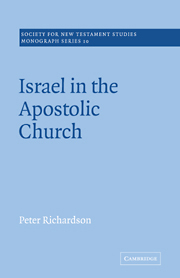II - THE CHURCH FATHERS TO A.D. 160
Published online by Cambridge University Press: 05 March 2010
Summary
JUSTIN AND THE TRUE ISRAEL
In his Dialogue with Trypho Justin asks Trypho and his friends: ‘What is the force (δύναμις) of the name, Israel?’ This also is the question asked here, but not in an etymological sense like Justin's. The other side of the question is: What does ‘Israel’ signify in relation to the Church? There is no doubt about the answer given in the dialogue: ʾΙσραηλιτκὸν γὰρ τὸ ἀληθινόν, πνευματικόν, καὶ ʾΙούδα γένος καὶ ʾΙακώβ καὶ ʾΙσαὰκ καὶ ʾΑΒραὰμ … ἡμεĩς ἐσμεν. The transference from Israel to the Church is complete; but, and this is the point we wish to make, Justin's dialogue with Trypho is the first time in Christian literature that such an explicit claim has been made.
One of the obvious marks of this transference is the increased emphasis on newness and finality. This comes in the opening paragraphs of the first main section, e.g. 11.2 f.: c For in fact I have read, Trypho, that there is to be both a final Law and a Disposition (τελευταĩος νόμος καὶ διαθήκη) that is superior to all others (κυριωτάτη πασων), which must now be observed by all those who lay claim to the inheritance of God. For the law given at Horeb is already antiquated (παλαιός) and belongs to you alone, but that other belongs to all men absolutely.
- Type
- Chapter
- Information
- Israel in the Apostolic Church , pp. 9 - 32Publisher: Cambridge University PressPrint publication year: 1969

